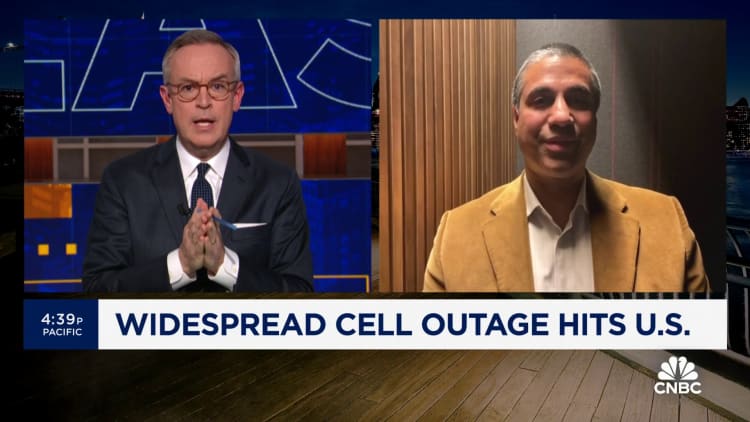A cellular tower is seen on Feb. 22, 2024 in Redondo Beach, California. The outage affected tens of thousands of customers in cities across the country whose phones lost signal overnight.
Eric Thayer | Getty Images News | Getty Images
‘It won’t be our last’
AT&T’s outage on Thursday knocked out service for tens of thousands of customers, who were unable to use their phones without access to Wi-Fi. It was the result of an internal company error — not a cyberattack — as AT&T worked to expand its network, it said.
AT&T is crediting consumers and small business customers “most impacted by the outage” to “compensate them for the inconvenience they experienced,” company CEO John Stankey wrote in a letter Sunday.

“This is not our first network outage, and it won’t be our last — unfortunately, it’s the reality of our business,” he wrote.
AT&T is crediting the average cost of a full day of service, it said.
The credit doesn’t apply to AT&T Business Enterprise and Platinum accounts, AT&T prepaid or Cricket, its low-cost service, the company said. Impacted prepaid customers “will have options available to them,” Stankey said, though didn’t elaborate.
Don’t wait for your provider
“My advice to consumers is, if you were impacted by this, don’t wait for AT&T to make the determination” as to whether you qualify for a credit, said John Breyault, vice president of public policy, telecommunications and fraud at the National Consumers League.
“Call and say, ‘I was impacted by this. I want to make sure I get the credit,'” he added.
Consumers who don’t want to call customer service may also be able to interface with a provider’s online portal or chatbot for speedier resolution, he said.
Of course, phone and internet companies apply such credits voluntarily, Breyault said. By contrast, federal law that governs the airline industry entitles consumers to a refund in cases of flight cancellations, for example. A similar consumer protection doesn’t seem to exist in the wireless arena, Breyault said.
The Federal Communications Commission in January proposed a rule that would require rebates for consumers who face programming blackouts on cable or satellite television subscriptions.
“It’s a time thing” for consumers to ask for a reimbursement, Weinstock said. “But I think it’d be worth it to always contact your carrier to say, ‘I had an outage. It wasn’t my fault, you owe me money. You should cover the cost of this.'”



